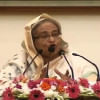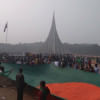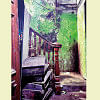Not at the cost of Muktijuddho, no way

The December 2024 edition of Chhatra Shibir's mouthpiece, the monthly Chhatra Sangbad (meaning student news) was themed after the mass uprising that loosely translates to "the bloody chapter of victory" (bijoy er roktakto oddhyay). One article in that magazine, discussing the downfall of tyrants through the ages (juge juge shoirachar o tader korun porinoti), states at one point, "Some Muslims participated in the Liberation War without fully comprehending the consequences. It was their failure and lack of foresight. May the Almighty forgive them."
Chhatra Shibir, which is the student wing of Jamaat-e-Islami, has expressed its regrets and withdrew the article and recalled the magazine. It is not available online or offline anymore. The fundamentalist students' organisation went on to say in a note of apology that the article had been published "inadvertently" and further that the views expressed in the article were the writer's own.
The explanation and apology might have been acceptable if it were any other organisation. But Shibir, and its parent organisation Jamaat, had violently and actively opposed the 1971 Liberation War. Shibir used to be called Islami Chhatra Sangha in 1971 and resurfaced in 1977 under this current name. Jamaat and its student wing are held responsible for a large number of atrocities committed by the notorious vigilante militia groups like Razakar, Al-Badr and Al-Shams, which consisted of members and activists of Jamaat and its student wing.
Neither Jamaat, nor its student wing has ever come clean regarding its role in 1971. Still deeply revered within the party, several Jamaat leaders have been tried, convicted and executed for their crimes against humanity. But the party and its student wing have never come forward to apologise for their role or admit to the atrocities their predecessors had committed out of their supposed conviction for a united Pakistan. Instead, both the party and its student wing continue to attempt to justify and vindicate their roles during the Liberation War. And sometimes, they test the waters to see how far they can go in public. This recent publication was one such instance.
The implicit suggestion of Shibir's response to the widespread criticism of the article is that the editorial board of the magazine had not vetted each article carefully before they were approved. This is not at all expected from an outfit as disciplined as Shibir. The insincere apology, because it does not own up to its misdeed (which is befitting its historical trend), only came about once the lines went viral on social media and Jamaat's student cadres realised they were fast losing support among the public. Almost as if they were dangling their feet to test the waters and pulled out sensing that the time was not yet ripe.
Just like in 1971, the article in question conflates religion with the inspiration for freedom. In fact, the writer is apologetic for even having waged war and begs forgiveness of the Almighty.
It is also important to take note of other omens. Take the Constitution Reform Commission's proposal for instance. It proposes the following two paragraphs in the preamble, "We, the people of Bangladesh have, in a historically persistent struggle for the emancipation of the masses of this land, achieved independence through a people's war (jonojuddho) and built a united resistance against autocratic and fascist rule;"
"We pledge, most respectfully remembering the supreme sacrifice of all martyrs, that the great ideals of equality, human dignity, and social justice that united the people of Bangladesh in the War of Independence in 1971 and the ideals of democracy and equity that united them against the fascist rule in 2024 shall be established in the state and society;"
The existing preamble had enshrined the Liberation War as a sacrosanct basis of the new republic born on March 26. The first graph reads, "We, the people of Bangladesh, having proclaimed our independence on the 26th day of March, 1971 and through a historic struggle for national liberation, established the independent, sovereign People's Republic of Bangladesh."
The proposed draft states "jonojuddho" (people's war) which is not the same as Liberation War or muktijuddho. The language recognises the mass uprising of 2024 and the war of independence of 1971 in the same breath! One was a full-blown war which gave birth to a new country. The other was a people's uprising of a kind that Bangladesh had not seen before and must be given their due credit. But certainly not by belittling the Liberation War; And yet, there has been very little criticism amid the post uprising dispensation where Jamaat and Shibir, having usurped significant sway, appear to influence much of the narrative post August 5.
The Liberation War is a unique event in Bangladesh's history. It will never happen again. Attempts to equate it with any other movements or campaigns reflect either a lack of wisdom or a deliberate effort to distort history. Unlike any political movement, the Liberation War was a struggle for existence, identity, and sovereignty. It was a full-scale war against a well-trained military machine. It was a national resistance against systematic genocide, oppression—in which Jamaat and its student collaborated with the perpetrators. Comparing it to any democratic movement insults its glory and undermines the sacrifices of millions who fought and perished for an independent Bangladesh.
Mass uprisings and popular campaigns, however significant, cannot be placed on the same pedestal as the Liberation War. Democratic struggles implicitly predicate the existence of an established nation-state. The 1971 War was about the very birth of that state. Any comparison trivialises that War and plays into the hands of those who seek to rewrite (read distort) history and change the narrative for their gain.
We have heard many more such phrases that liken 2024 with 1971 in the last several months. This new Bangladesh had to be rebuilt from scratch, everyone said. Proclamation of revolution was mentioned in the beginning. The Mujibist constitution had to be done away with and in a bid to rid it of Mujibism, the proposed draft of the constitution now trivialises the 1971 War.
The rhetoric of a new beginning in the post August 5 dispensation often carried an unspoken suggestion, a fleeting allusion that it is all "as opposed to 1971." There is almost an instinctive feeling that there is an ever so subtle attempt to not just rewrite history, but delete it. A second liberation it can very well be, but that does not make it equal to the first one, when the country was born.
Attempts to equate the Liberation War with other political movements, or belittle it, can no longer be shrugged off as adolescent aberration or dismissed as youthful ignorance.They are not.
Tanim Ahmed is digital editor at The Daily Star.
Md Abbas is a journalist at The Daily Star. He can be reached at [email protected].
Views expressed in this article are the author's own.
Follow The Daily Star Opinion on Facebook for the latest opinions, commentaries, and analyses by experts and professionals. To contribute your article or letter to The Daily Star Opinion, see our guidelines for submission.


 For all latest news, follow The Daily Star's Google News channel.
For all latest news, follow The Daily Star's Google News channel. 









Comments